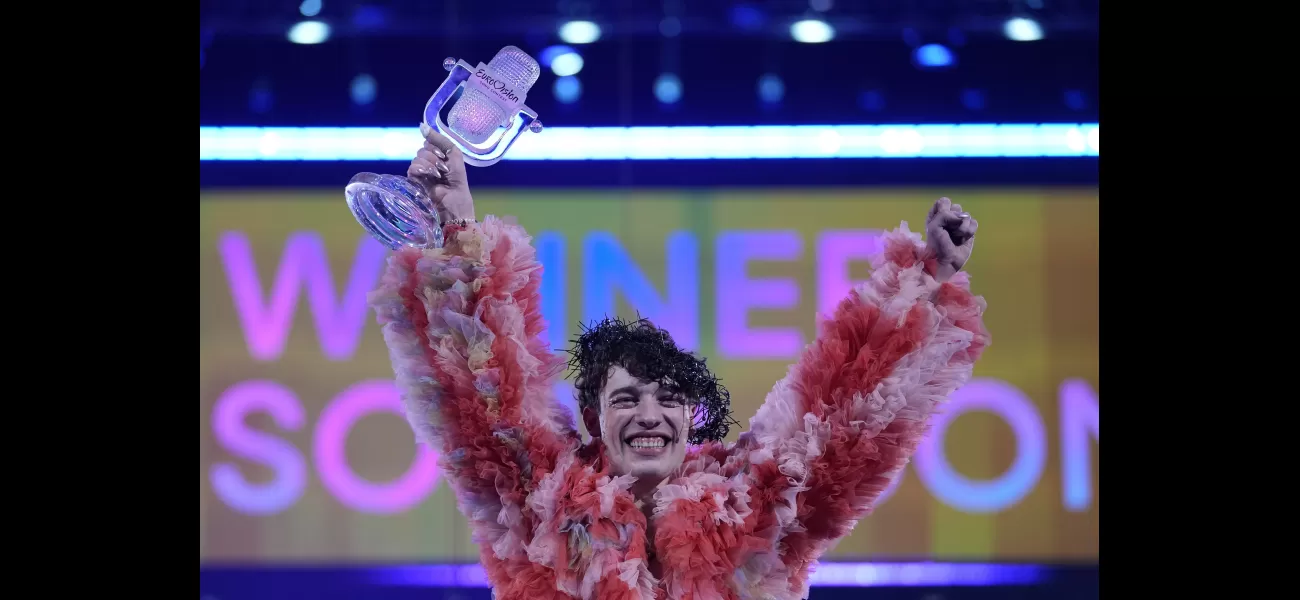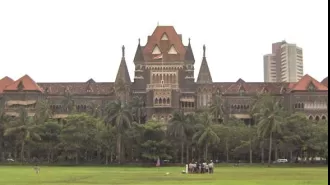A Swiss act named Nemo triumphs at Eurovision Song Contest.
Swiss singer Nemo won Eurovision with an operatic pop-rap song about their journey to embracing their nongender identity.
May 11th 2024.

In a beautiful and inspiring display of musical talent, Swiss singer Nemo has been crowned the winner of the 68th Eurovision Song Contest. Their song, The Code, is a powerful mix of operatic vocals and rap, and tells the story of Nemo's personal journey towards embracing their non-gender identity. It was truly a momentous occasion as Nemo beat out Croatia's Baby Lasagna for the top spot, earning the most points from both national juries and viewers all around the world.
This victory is not only significant for Nemo, but also for the Eurovision Song Contest as a whole. Nemo is the first non-binary winner in the contest's history, which dates back to 1956. Their win is a testament to the progress and diversity that the contest champions, and Nemo hopes that their victory will continue to promote peace and acceptance for all individuals.
The Eurovision Song Contest, held in the Swedish city of Malmo, has faced its fair share of challenges this year. The participation of Israel sparked large street protests, and the ongoing conflict in Gaza overshadowed the typically joyous event. In addition, there was an incident involving Dutch competitor Joost Klein, who was expelled from the competition after a backstage altercation. However, despite these obstacles, Nemo emerged victorious, surpassing 24 other talented finalists with their captivating performance.
Each contestant had only three minutes to capture the hearts of the live audience and the estimated 180 million viewers watching from home. The performances were a diverse mix of musical genres, ranging from rock and disco to techno and rap, with some even combining multiple styles. The competition also featured a mix of established artists and up-and-coming talent, including identical twins Marcus and Martinus from Sweden and Ukrainian duo alyona alyona & Jerry Heil.
The show also paid tribute to Eurovision's most iconic moment, when ABBA won with their hit song "Waterloo" back in 1974. Though the legendary group did not appear in person, their digital "ABBA-tars" from the ABBA Voyage stage show did make an appearance. In addition, a trio of former Eurovision winners performed "Waterloo" on stage as votes were being cast and counted.
The Eurovision Song Contest is known for its eclectic mix of performances, and this year was no exception. From Lithuania's Silvester Belt, a charming young crooner, to Ireland's gothic Bambie Thug, who summoned a demon on stage and brought a scream coach with them, the competition was full of surprises. Other notable performances included Finland's Windows95man, who emerged from a giant onstage egg wearing very little clothing, and Spain's Nebulossa, who boldly reclaimed a derogatory term used against women.
As expected, Nemo and Baby Lasagna were among the top contenders going into the competition. Baby Lasagna's energetic rock song, "Rim Tim Tagi Dim," addressed the issue of young Croatians leaving their country in search of a better life. However, Eurovision's motto of "united by music" was put to the test this year, as the event faced protests and dissent. Thousands of pro-Palestinian demonstrators marched in Sweden's third-largest city, demanding a boycott of Israel and an end to the conflict in Gaza. Despite these tensions, the show went on, and Nemo's message of unity and acceptance prevailed.
In the end, Nemo's powerful performance and message resonated with both the judges and the viewers, leading them to victory. As they accepted their trophy, Nemo expressed their gratitude and hope for the Eurovision Song Contest to continue promoting peace and dignity for all individuals. Other contestants also spoke about the importance of love and unity during these trying times, reminding us all of the healing power of music and the Eurovision community.
In a world that can often feel divided, the Eurovision Song Contest serves as a reminder of the beauty and diversity of humanity. As last year's winner, Loreen, stated, "What heals trauma... Does trauma heal trauma? Does negativity heal negativity? It doesn't work like that. The only thing that heals trauma for real - this is science - is love." And with Nemo's win, love and acceptance have once again triumphed on the Eurovision stage.
This victory is not only significant for Nemo, but also for the Eurovision Song Contest as a whole. Nemo is the first non-binary winner in the contest's history, which dates back to 1956. Their win is a testament to the progress and diversity that the contest champions, and Nemo hopes that their victory will continue to promote peace and acceptance for all individuals.
The Eurovision Song Contest, held in the Swedish city of Malmo, has faced its fair share of challenges this year. The participation of Israel sparked large street protests, and the ongoing conflict in Gaza overshadowed the typically joyous event. In addition, there was an incident involving Dutch competitor Joost Klein, who was expelled from the competition after a backstage altercation. However, despite these obstacles, Nemo emerged victorious, surpassing 24 other talented finalists with their captivating performance.
Each contestant had only three minutes to capture the hearts of the live audience and the estimated 180 million viewers watching from home. The performances were a diverse mix of musical genres, ranging from rock and disco to techno and rap, with some even combining multiple styles. The competition also featured a mix of established artists and up-and-coming talent, including identical twins Marcus and Martinus from Sweden and Ukrainian duo alyona alyona & Jerry Heil.
The show also paid tribute to Eurovision's most iconic moment, when ABBA won with their hit song "Waterloo" back in 1974. Though the legendary group did not appear in person, their digital "ABBA-tars" from the ABBA Voyage stage show did make an appearance. In addition, a trio of former Eurovision winners performed "Waterloo" on stage as votes were being cast and counted.
The Eurovision Song Contest is known for its eclectic mix of performances, and this year was no exception. From Lithuania's Silvester Belt, a charming young crooner, to Ireland's gothic Bambie Thug, who summoned a demon on stage and brought a scream coach with them, the competition was full of surprises. Other notable performances included Finland's Windows95man, who emerged from a giant onstage egg wearing very little clothing, and Spain's Nebulossa, who boldly reclaimed a derogatory term used against women.
As expected, Nemo and Baby Lasagna were among the top contenders going into the competition. Baby Lasagna's energetic rock song, "Rim Tim Tagi Dim," addressed the issue of young Croatians leaving their country in search of a better life. However, Eurovision's motto of "united by music" was put to the test this year, as the event faced protests and dissent. Thousands of pro-Palestinian demonstrators marched in Sweden's third-largest city, demanding a boycott of Israel and an end to the conflict in Gaza. Despite these tensions, the show went on, and Nemo's message of unity and acceptance prevailed.
In the end, Nemo's powerful performance and message resonated with both the judges and the viewers, leading them to victory. As they accepted their trophy, Nemo expressed their gratitude and hope for the Eurovision Song Contest to continue promoting peace and dignity for all individuals. Other contestants also spoke about the importance of love and unity during these trying times, reminding us all of the healing power of music and the Eurovision community.
In a world that can often feel divided, the Eurovision Song Contest serves as a reminder of the beauty and diversity of humanity. As last year's winner, Loreen, stated, "What heals trauma... Does trauma heal trauma? Does negativity heal negativity? It doesn't work like that. The only thing that heals trauma for real - this is science - is love." And with Nemo's win, love and acceptance have once again triumphed on the Eurovision stage.
[This article has been trending online recently and has been generated with AI. Your feed is customized.]
[Generative AI is experimental.]
0
0
Submit Comment





